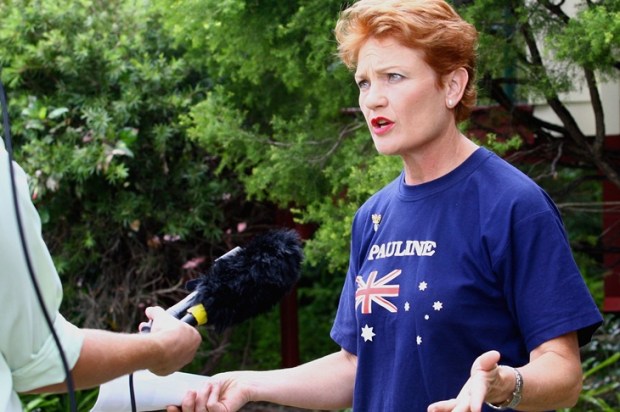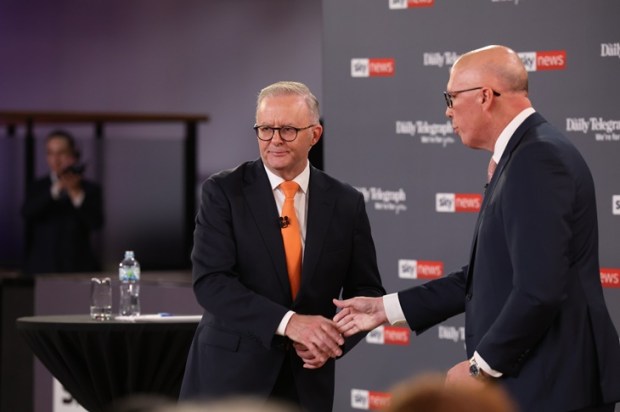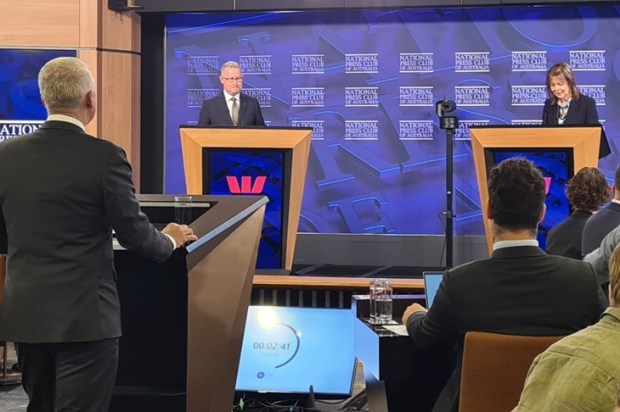From the National Press Club: Clive Palmer’s address on March 13 delivered the first tranche of the Trumpet of Patriot’s election platform. While one regional newspaper took issue with humans being either male or female, conservative voters will find little to disagree with in what is otherwise a common-sense policy platform.
Indeed, many wish the Coalition would adopt such a platform. The Uniparty thesis is such that this election is shaping up to be another bland, small-target strategy election where the difference between the major parties is as boring as it gets. As a consequence, many conservatives appear to be voting with their feet by moving to the conservative minor parties.
My biggest concern with the fracturing of the conservative vote is that it will return Labor to power. Historically, the Coalition needs to get more than 41 per cent of the primary vote and beat the total of Labor’s and the Greens’ primary vote. Simon Holmes à Court confirmed this in his address to the Press Club on March 11 when he indicated that any seat where the incumbent had less than 43 per cent of the primary vote was a target for the Teals.
Whether the Teals have the same impact on Labor and the Greens remains to be seen, but they are without a doubt anti-Coalition.
I asked Mr Palmer how Trumpet of Patriots would implement their platform if the fractured conservative vote returned a Labor government:
Michael de Percy: ‘Mr Palmer… many of our readers would find common sense in your policies but one of my concerns is that you’re going to fracture the conservative vote and return a Labor government. What is your strategy if that happens and how will you try and get your policies implemented if Labor… are returned?’
Clive Palmer: ‘Well, firstly, we don’t think that’s true … your first proposition, because these policies are not adopted by any other party in the country at the moment, right. You may have people that, [are notionally] conservative, that might get a half a percent of the vote or whatever, but they’re not generally promoted, and they haven’t got these sort of policies so when a party stands whether it’s conservative whether it’s Labor or whatever it’s what you’re standing for. My view is [that] the Liberal Party and the Labor Party are the Uniparty. You might agree with that, you might say, well, I like the Liberal Party more, right, I don’t know what you say, but I’m just suggesting, right, but I think they’re all bad. I haven’t met a good politician yet that’s not interested in getting reelected that wouldn’t sell his mother and sister for re-election rather than do what’s better for the country. I’ve been in Parliament, I’ve sat there, I’ve met with all of them, right, they’re not an impressive lot. I say throw them out! Throw them all out … that’s what I think should happen. I’m an Australian and … I’ll say that as loud as I can.’
Senator Ralph Babet was in attendance, although he is not up for re-election in the Senate until 2028. Babet will remain with the United Australia Party as its only federal representative, despite the creation of the Trumpet of Patriots party. I am frequently concerned by how the mainstream media misrepresents some politicians. In person, Babet is extremely charismatic, friendly, and ever the gentleman.
Mr Palmer spoke about the issues with aluminium and steel and how the likes of BHP and Rio Tinto had historically secured iron ore rights that, in his view, ought to be subject to licence fees (royalties) of 15 per cent and how US President Donald Trump’s tariffs on aluminium and steel were so insignificant in the grand scheme of Australian exports that the brouhaha over the tariffs was a non-event.
While there is surely some cognitive dissonance around a Make Australia Great Again strategy based on a foreign power’s Make America Great Again strategy, Mr Palmer was quick to point out that Australian Ambassador to the US, Kevin Rudd, along with Mr Albanese and other senior Labor ministers who had insulted Mr Trump, were not acting in Australia’s interests. It’s pretty hard to disagree unless you’re completely suffering from TDS (Trump derangement syndrome).
Yet the mainstream media were quick to focus on Mr Palmer’s on-stage penchant for Tim Tams and to suggest that his bowing and referring to a statement about two genders was an apology when he meant two sexes (men and women). This was, well, let’s just say, stretching a long bow.
In general, there was not a lot that conservatives would disagree with, but rather than being a deliberate strategy to unseat a particular party (like the Teals), Mr Palmer, referring to his family’s record in serving in the Australian military in the first and second world wars and in Vietnam, and his interest in Australian politics as his own form of ‘lawn bowls’ now he is 71 (he is actually still 70, as Andrew Probyn pointed out), the only thing controversial was that it ought to have been the Liberal Party’s policy platform.
If my ‘fracturing the conservative vote’ thesis proves correct, and Labor is returned, the worst-case scenario is that the Coalition has a blueprint for victory at the next election. Unless of course Mr Dutton has a D-Day policy avalanche planned for after the inevitable election date announcement.
But I am increasingly concerned that the Coalition are focused on winning in 2028, leaving ordinary Australians to their fate for another three years of the worst government in Australian history. In the meantime, the Trumpet of Patriots’ policy platform is almost Menzian in its intent, while at the same time making it too easy for the mainstream media to focus on the gender wars and Tim Tams.
For all the smarminess towards Mr Palmer’s good intentions, his election platform might otherwise have paved the way for a government to look after the interests of those people who have been forgotten by the Liberal Party.
Byline: Dr Michael de Percy FRSA FCILT MRSN @FlaneurPolitiq is a political scientist and political commentator. He is a member of the Federal Parliamentary Press Gallery, Editor-in-Chief of the Journal of Telecommunications and the Digital Economy, Chairman of the ACT and Southern NSW Chapter of the Chartered Institute of Logistics and Transport, and a member of the Australian Nuclear Association. Michael is a graduate of the Royal Military College, Duntroon and was appointed to the College of Experts at the Australian Research Council in 2022. All opinions in this article are the author’s own.


























